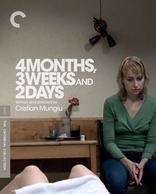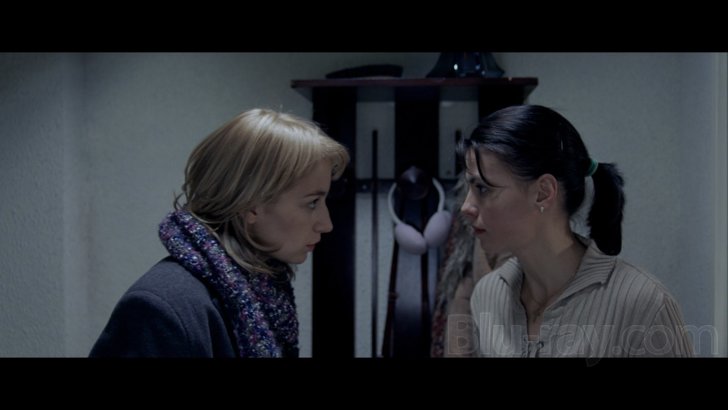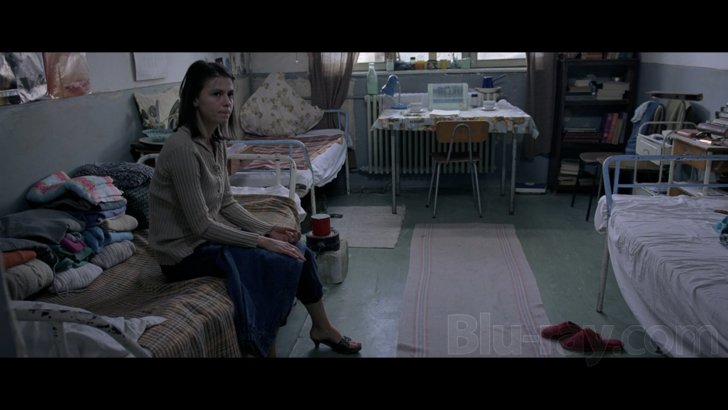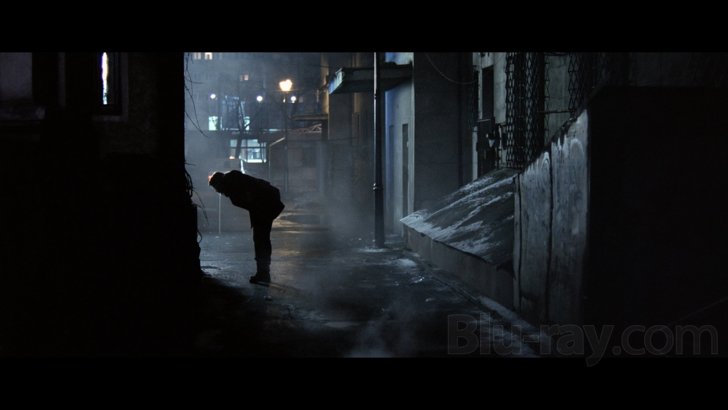4 Months, 3 Weeks and 2 Days Blu-ray Movie
Home4 Months, 3 Weeks and 2 Days Blu-ray Movie 
4 luni, 3 săptămâni și 2 zileCriterion | 2007 | 113 min | Not rated | Jan 22, 2019

Movie rating
7.5 | / 10 |
Blu-ray rating
| Users | 0.0 | |
| Reviewer | 5.0 | |
| Overall | 5.0 |
Overview
4 Months, 3 Weeks and 2 Days (2007)
During the final days of communism in Romania, two college roommates, Otilia and Găbița, are busy preparing for a night away. But rather than planning for a holiday, they are making arrangements for Găbița's illegal abortion and unwittingly, both find themselves burrowing deep down a rabbit hole of unexpected revelations.
Starring: Anamaria Marinca, Vlad Ivanov, Laura Vasiliu, Alexandru Potocean, Luminita GheorghiuDirector: Cristian Mungiu
| Foreign | Uncertain |
| Drama | Uncertain |
Specifications
Video
Video codec: MPEG-4 AVC
Video resolution: 1080p
Aspect ratio: 2.39:1
Original aspect ratio: 2.39:1
Audio
Romanian: DTS-HD Master Audio 5.1 (48kHz, 24-bit)
Subtitles
English
Discs
50GB Blu-ray Disc
Single disc (1 BD)
Playback
Region A (locked)
Review
Rating summary
| Movie | 5.0 | |
| Video | 5.0 | |
| Audio | 5.0 | |
| Extras | 3.5 | |
| Overall | 5.0 |
4 Months, 3 Weeks and 2 Days Blu-ray Movie Review
Reviewed by Dr. Svet Atanasov January 15, 2019Cristian Mungiu's "4 Months, 3 Weeks and 2 Days" (2007) arrives on Blu-ray courtesy of Criterion. The supplemental features on the disc include an original U.S. trailer for the film; video interview with the director; video interview with critic Jay Weissberg; alternate and deleted scenes; and more. The release also arrives with an illustrated leaflet featuring an essay by critic Ella Taylor and technical credits. In Romanian, with optional English subtitles for the main feature. Region-A "locked".

A trusted friend
It is possible that there are other critics that have deconstructed the genesis of the Romanian New Wave as Jay Weissberg does in the long interview that he recorded for this release, but this is the first time that I have seen someone place a lot of key developments that preceded its emergence in the proper context. Weissberg’s admission that the entire ‘movement’ was essentially invented by critics in the West that wanted to rationalize their own understanding of the films that were being made in the county after the fall of Nicolae Ceausescu’s communist government is especially important because it finally, and rightfully, dismisses a very popular myth. However, in the interview Weissberg also makes a few points that are inaccurate, and I will quickly address them below as I comment on Christian Mungiu’s film.
The most important truth that emerges from the interview is that the Romanian New Wave was not an organized movement that pursued a common goal. (For reference, Dogme 95, which emerged in Denmark during the early ’90s, was the last legit classic European cinematic movement). The young Romanian directors that began working in the vacuum after the Uprising were quite simply the first to get an opportunity to create without the explicit approval of the communist censors. In other words, the ‘movement’ was an organic wave of activity that slowly began delivering a variety of documentaries and smaller films. However, as Weissberg correctly points out, at the time virtually no one in the West was paying attention, and it was only some years later after Mungiu’s film won the Palme d’Or at Cannes that the work of these young directors became attractive to foreign audiences.
While social realism was at the very core of the films that Mungiu and the rest of the directors were making, there wasn’t a coordinated effort to produce and deliver a specific image of post-Ceausescu Romania. This is very important to underscore. All of the stylistic similarities that Weissberg apparently sees in these films, such as the presence of long takes and very limited editing, are not delivered by common preferences either, but are actually determined by the nature of the projects that the directors were able to do. Basically, they used the limited funds that they had to capture Romanian reality as it was before their eyes -- ugly, demoralizing, and frequently completely devoid of humanity -- not while intentionally placing a special emphasis on crucial details that would give their films a particular appearance. For what it’s worth, there isn’t much of a confusion as to who were the people that spilled blood and crushed the Uprising either. When ordinary Romanians flooded the streets of their country to overthrow the communist government, Ceausescu’s henchmen went on a killing spree. And when it became obvious that the Soviets will not roll the tanks again -- as they did during the anti-communist uprisings in Budapest in 1956 and Prague in 1968 -- a different faction of the Party took over the country and declared victory. It is the very reason why the Uprising failed to bring real change in Romania, and why even after the Soviet Bloc officially collapsed the communist elite continued to rule the country. The frustration and disillusionment that engulfed the country after Ceausescu’s execution never disappeared, and this is the very reason why they are frequent themes in Mungiu’s films (see Graduation and Beyond the Hills).
The story of Mungiu’s breakthrough film is actually incredibly simple. Otilia (Anamaria Marinca) begins looking for a ‘specialist’ that could help her friend Gabita (Laura Vasliu) remove the unwanted baby that is growing in her tummy. Because abortion is illegal in the country, the entire procedure will have to be performed without proper medical care and in complete secrecy. The right man (Vlad Ivanov) for the job is eventually located and brought into a crumbling hotel room that the two girls have booked. Before he goes to work, however, he warns that there is a considerable risk associated with the recovery process.
All of the noise that people with ties to certain pro-life and pro-choice groups created while arguing the film’s identity and message is utterly irrelevant. Gabita’s decision to have an abortion is actually not debated at all in the film; Mungiu enters the bleak reality in which the two girls make their decisions and then attempts to preserve it with his camera as best as he can. No one is judged or condemned.
4 Months, 3 Weeks and 2 Days Blu-ray Movie, Video Quality 

Presented in its original aspect ratio of 2.39:1, encoded with MPEG-4 AVC and granted a 1080p transfer, Cristian Mungiu's 4 Months, 3 Weeks and 2 Days arrives on Blu-ray courtesy of Criterion.
The following text appears inside the leaflet that is provided with this Blu-ray release:
"This new 4K digital restoration was undertaken by director Christian Mungiu from the 35mm original camera negative. The film features a fully digital soundtrack. The 5.1 surround audio for this release was mastered from the original digital audio master files using Pro Tools HD.
Transfer supervisor: Cristian Mungiu.
Colorist: Laurent Morel."
The only other release of this film that I currently have in my library is the R2 DVD which British distributors Artificial Eye produced some years ago. I did only a few quick comparisons because I knew what to expect, and I can confirm the gap in quality between the two really is beyond dramatic. The most obvious upgrades are during the darker footage where on the new transfer there are nuances that quite simply do not exist on the DVD release, but even the daylight footage looks vastly superior because the grading is so much better balanced. Folks with projectors will also be pleased to hear that depth is outstanding. There are no stability issues to report. Fantastic technical presentation. (Note: This is a Region-A "locked" Blu-ray release. Therefore, you must have a native Region-A or Region-Free player in order to access its content).
4 Months, 3 Weeks and 2 Days Blu-ray Movie, Audio Quality 

There is only one standard audio track on this Blu-ray release: Romanian DTS-HD Master Audio 5.1. Optional English subtitles are provided for the main feature. When turned on, they appear inside the image frame.
As clarified in the technical credits the film features a fully digital soundtrack, so the 5.1 track basically reproduces what its creators finalized in the studio. There are plenty of organic sounds and noises that are essential for the intended atmosphere, but clarity and stability are outstanding.
4 Months, 3 Weeks and 2 Days Blu-ray Movie, Special Features and Extras 

- Jay Weissberg - in this video interview, critic Jay Weissberg discuses the socio-political environment in which the Romanian New Wave emerged, some of the key films from the directors that are associated with it, Cristian Mungiu's international success and its importance for the popularization of contemporary Romanian cinema, the tone and stylistic appearance of 4 Months, 3 Weeks and 2 Days, etc. The interview was recorded exclusively for Criterion in 2016. In English, not subtitled. (25 min, 1080p).
- Cristian Mungiu - in this video interview, director Cristian Mungiu discusses the genesis of 4 Months, 3 Weeks and 2 Days and some of the key characteristics of the social reality that is preserved in it. The interview was conducted exclusively for Criterion in 2016. (38 min, 1080p).
- Cannes Conference - presented here is a filmed version of the press conference that was held at the Cannes Film Festival in 2007, where 4 Months, 3 Weeks and 2 Days won the prestigious Palme d'Or Award. The panel features director Cristian Mungiu, cinematographer Oleg Mutu, and actors Laura Vasilu, Vlad Ivanov, and Alexandru Potocean. In French, English, and Romanian, with optional English subtitles where necessary. (45 min, 1080p).
- The Romanian Tour - presented here is a short archival featurette in which Romanian audience members describe their feelings and emotions after viewing 4 Months, 3 Weeks and 2 Days. The featurette was produced in 2007. In Romanian and German, with optional English subtitles. (16 min, 1080i).
- Alternate and Deleted Scenes - in Romanian, with optional English subtitles. (14 min, 1080i).
1. Alternate Ending One
2. Alternate Ending Two
3. Deleted Scene
- Trailer - original U.S. trailer for 4 Months, 3 Weeks and 2 Days produced by IFC Films. In Romanian and English text, with imposed English subtitles where necessary. (2 min, 1080p).
- Leaflet - an illustrated leaflet featuring critic Ella Taylor's essay "Late Term" and technical credits.
4 Months, 3 Weeks and 2 Days Blu-ray Movie, Overall Score and Recommendation 

In the West very few people saw the big picture, and the tiny number that were actually paying attention before, during, and after the bloody Uprising started in Timișoara refused to tell the truth. The quick execution of Nicolae Ceaușescu was nothing more than a facade that allowed a different faction of the Romanian Communist Party to take over the Uprising and then restore and solidify its control of the country. During the transition period after Ceausescu was buried, the ideological grip that the communists had on society became irrelevant because they were too busy redistributing the economic wealth of their country and ensuring that they will remain in power after the Soviet Bloc officially ceased to exist. Sadly, not only were their efforts successful, but the exact same faction of the Romanian Communist Party eventually produced the country's 'new' political elite and pushed it into the European Union. It is why hardly anything changed after the Uprising and ordinary Romanians continued to struggle -- the old masters from the Kremlin were replaced with their contemporary ideological counterparts in Brussels and the country again lost the ability to determine its fate.
Cristian Mungiu's award-winning film 4 Months, 3 Weeks and 2 Days is set during that exact period when the communists realized that economic power was a lot more important than their ideology and began preparing for their post-Cold War survival. In the vacuum that emerged there was incredible misery and inhumanity that actually destroyed many more Romanian lives than the Uprising did. The film tells a bone-chilling but very authentic story while Mungiu essentially documents with his camera bits of the aftermath of the complete destruction of the social fabric of his homeland. VERY HIGHLY RECOMMENDED.
Similar titles
Similar titles you might also like

Umberto D.
1952

Kings of the Road
Im Lauf der Zeit
1976

Betty
1992

Au revoir les enfants
1987

Beyond the Hills
După dealuri
2012

Phoenix
2014

Like Someone in Love
ライク・サムワン・イン・ラブ / Raiku samuwan in rabu
2012

Where Is the Friend's House?
خانه دوست کجاست / Khane-ye doust kodjast?
1987

Brink of Life
Nära livet
1958

Blind Chance
Przypadek / Uncensored Version
1987

A Separation
Jodaeiye Nader az Simin
2011

Thirst
Törst
1949

Roma
2018

Aparajito 4K
অপরাজিত / The Unvanquished
1956

Le beau Serge
1958

The Banishment
Izgnanie
2007

Babette's Feast
Babettes gæstebud
1987

The Wild Pear Tree
Ahlat Ağacı
2018

Rosetta
1999

The Hunt
Jagten
2012